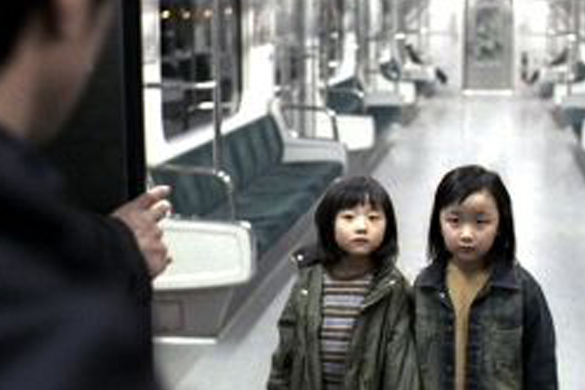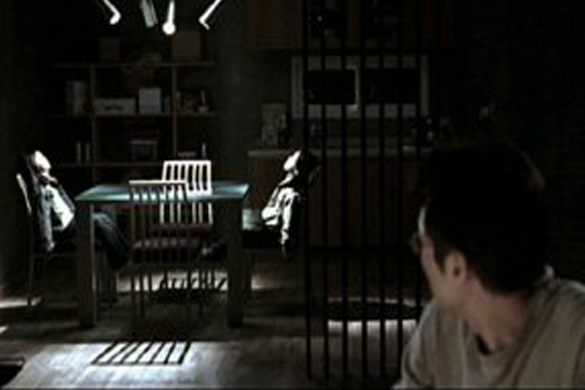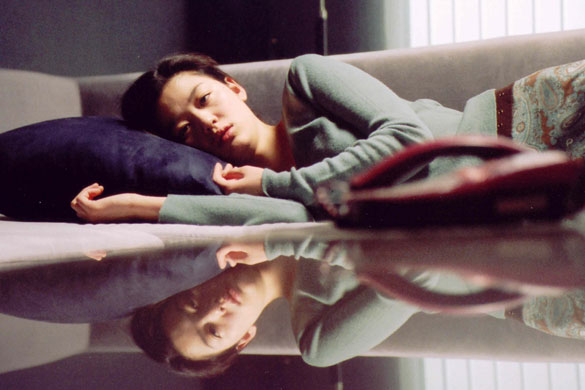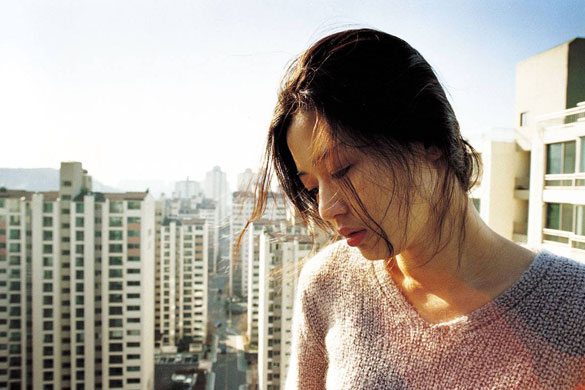
 |
||||
Jeong-won (Park Shin-yang) is an interior designer whose marriage to Hee-eun (Yoo Sun) is fast approaching. Returning to his apartment late one evening, he discovers his fiancée has bought a rather gaudy, modern-looking four-seat dining table – positioning the lights to shine on the seats, rather than the table itself – and in spite of his reservations about its aesthetic value (or lack thereof) he accepts Hee-eun’s judgement that it is the ideal centrepiece for family get-togethers.
Review: Many of you reading this review will already be aware that ‘The Uninvited’ is only the international English language title of Lee Soo-yeon’s 2003 film; the original Korean title, 4인용식탁, actually translating as ‘Table for 4'. As often as not, changes to Korean film titles for international release are made in an effort for them to be universally understood (Eungyo becoming A Muse, for example); to ensure they're perhaps more readily accepted (Dead Friend becoming Ghost); or make them less culturally specific, as is the case with Table for 4 becoming The Uninvited. However, not only do such changes all too often result in rather bland nomenclature that at the very least does the film in question no justice whatsoever it also, again as often as not, either strips away inherent thematic references or indeed adds an implication of themes that were never present to begin with. Okay, so it may be a small enough point and you'd be well within your rights to say “It's just a title, it won't alter what the film itself ultimately has to say" but in the case of The Uninvited changing the title from Table for 4 it's a bit of a shame nonetheless that non-Korean speakers are denied an early and instant heads-up to a cultural theme that underpins a great deal of the film's narrative, certainly as it relates to Jeong-won... but more on that in a moment. You need only walk into almost any Korean restaurant – domestically or internationally – or peruse a random selection of Korean movies from over the years regardless of genre to see in no uncertain terms just how important communal meals are to Korean familial culture at large. Whether we're talking about family members bonded by blood or family in a more general group bonding sense, gatherings around a communal dining table speak hugely of normality and wellbeing within a Korean familial group. The fact that from the moment the gaudy table is brought into Jeong-won’s apartment until the very last scene in the film (which has a separate implied commentary, in its own right) not a single family meal takes place around it to my mind screams early on about Jeong-won’s family unit perhaps not being as normal as it would outwardly appear. Add to that the fact that – again for the majority of the narrative – the only individuals seen sitting at this supposed communal hub/centrepiece are the ghostly corpses of two children and combine that with Jeong-won’s admission that he cannot remember anything from before he was seven years old and, as far as I'm concerned, director Lee Soo-yeon is from virtually the outset of The Uninvited/Table for 4 resolutely stating that Jeong-won ‘s familial past is far darker than even he is aware. Admittedly, Jeong-won does have communal meal at his father's church home but that's pretty much his dad's turf –as such largely referencing his dad's perception of the family unit rather than Jeong-won’s – and in fact his father specifically states he is happier than he has been for a long time exactly at the point where Jeong-won is more unsettled, less content and less sure of how much of what he has always been told about his family is true than he has been since the childhood he can't remember. Likewise, Yeon's ability to see the corpses at the table, too, gives an early inference that her family life has been somehow devastated, even before we're aware of the tragedy that's befallen her. As characters’ familial psychological scars increasingly turn to mental instability and relationships disintegrate yet further, the biggest question remaining is who this ominous table for four will ultimately be set for?
There will be another brief thematic discussion at a later point in this review but for the time being, themes aside, how well does The Uninvited/Table for 4 work as a horror, specifically, and how does it stand in comparison to classic Korean horrors of its time in the midst of the New Korean Cinema wave, in general? The Uninvited/Table for 4 is sumptuously ominous, brooding and foreboding from the outset and throughout. Within just minutes, the realisation that the two young children seated beside and opposite Jeong-won on the train are dead is at once nerve-tingling and shocking and their sudden appearance soon after as eerily lit apparitions at his new dining table would make even horror veterans feel a shiver up their spines. However, while such classic horror narrative sub-threads are hugely effective (further continuing with the children appearing silent and staring in Jeong-won’s nightmares and being seen time and again at the aforementioned table, as he increasingly becomes mentally frayed), the core of the majority of horror present in The Uninvited/Table for 4 is far more nuanced. For, here we have a film that focuses on horrors based in reality rather than concentrating on jump scares, vengeful spirits or ghostly paranormal activity – the things that humans are capable of and the sometimes shocking depths to which they are prepared to go, critiquing society as a whole and referencing what life in the modern world can do to a mind, in the process – and let’s be honest, depictions of such true-to-life horrors and atrocities are frankly far more chilling than most any spectre-filled ghost-fest ever could be. Indeed, the number of depictions of and references to the death of children in the film makes it all the darker and more shocking still.
Pacing in The Uninvited/Table for 4 is far more reserved than is the case in the majority of more recent horror fare from Korea or elsewhere. While fans of newer ‘shock/awe’ horrors may find that a little frustrating, to my mind it is actually one of The Uninvited/Table for 4’s many strengths, allowing the characters’ increasingly frayed mind sets, disjointed interactions and hidden secrets to positively ooze from the screen over time. Ultimately, as was the case with Sorum in 2001, viewers coming to The Uninvited/Table for 4 with an open mind and few preconceptions of the type of horror they are about to witness will find a gripping, shocking and thought-provoking narrative within a powerful film that has genuine scares because of its realism rather than in spite of it. On a final thematic note, the idea of and need for belief, or a lack thereof, plays a significant role throughout The Uninvited/Table for 4:On having seen Jeong-won with Yeon at a hotel, Hee-eun refuses to listen to her fiancée's protestations of innocence, already knowing she wouldn't believe him – even relating a story about a drought-plagued village, as quoted above prior to the film's synopsis; Jeong-won has ongoing difficulties believing that Yeon can unlock the lost memories of his childhood; and most importantly Yeon repeatedly claims “You don't believe me, do you?” in response to discussions of a number of subjects. In terms of the latter, it is virtually impossible not to feel that she is at all points referring to a tragic incident involving her and her friend Jung-sook (Kim Yeo-jin) – an incident that started Yeon's narcolepsy and indeed mental issues and led to Jung-sook facing court proceedings. We are shown the specific moment in question on more than one occasion with Jung-sook standing at an open window and Yeon by the apartment door. However, in its final iteration (as part of the court testimony of an apartment block caretaker) while the audio description of the women's positions remains unchanged, visually the two women have switched with Yeon (momentarily) shown at the window and Jung-sook by the door. Which visuals viewers ultimately believe and indeed whether you ultimately believe Yeon's story is up to each individual to decide for themselves but even though I can almost guarantee which side of the fence you'll land on – especially in the wake of Jung-sook’s actions after the court ruling – thought provocation is given nonetheless... another stand-out strength of an already exemplary film.
THE UNINVITED / TABLE FOR 4 (4인용식탁 / 2003)
|
||||
All images © CJ Entertainment, Palisades Tartan Review © Paul Quinn |
||||



